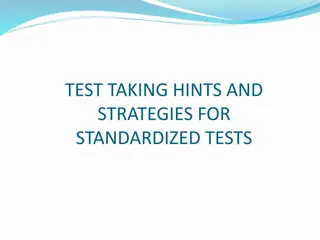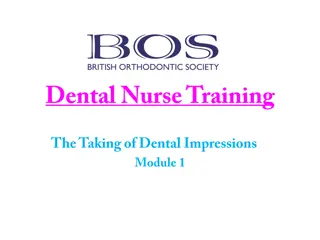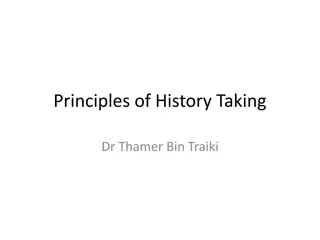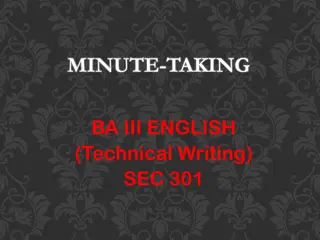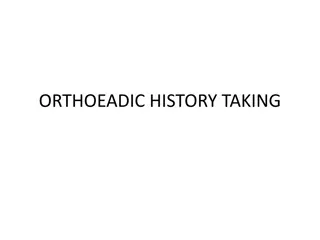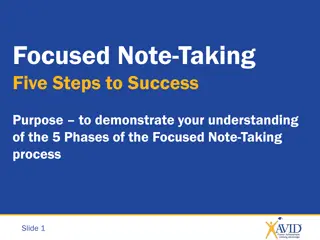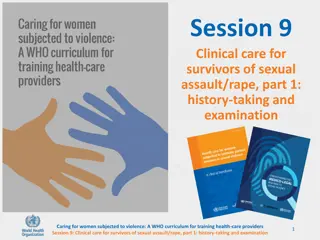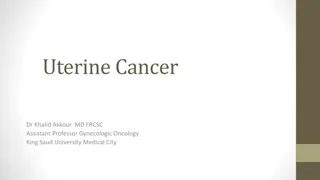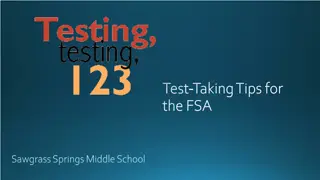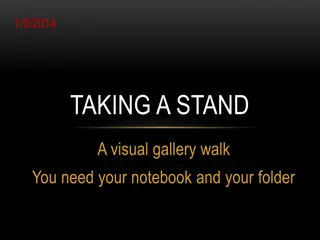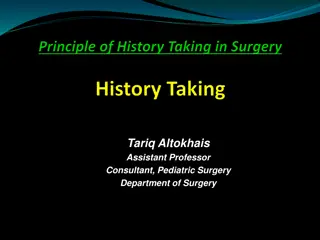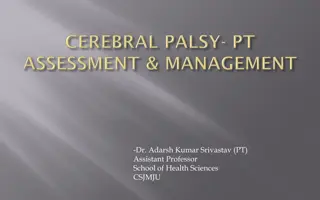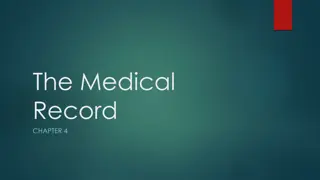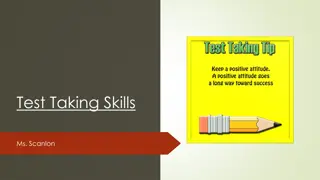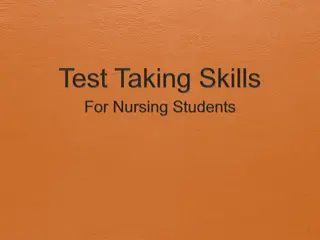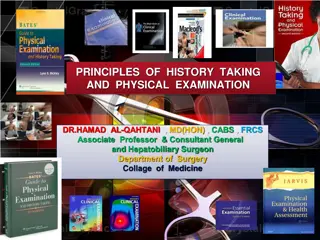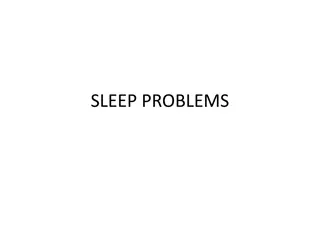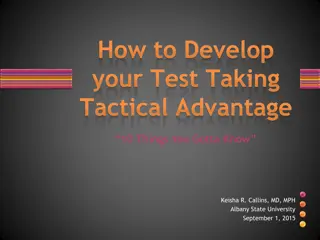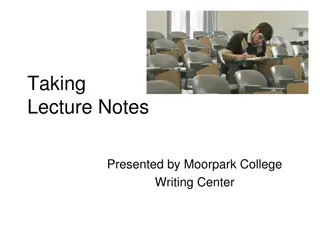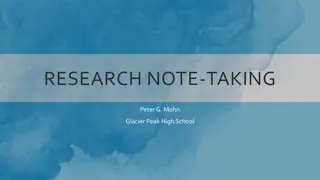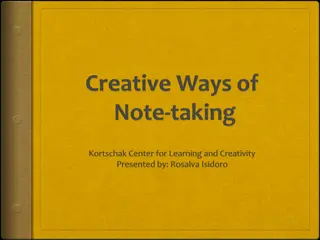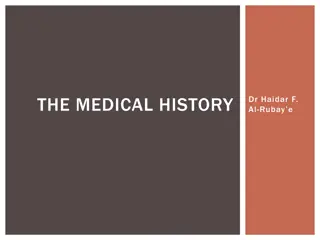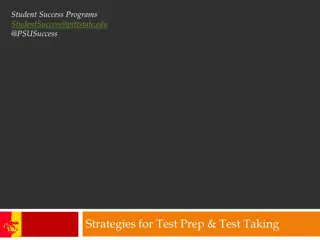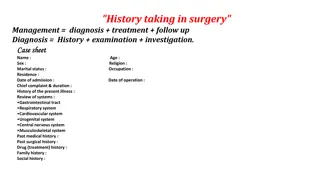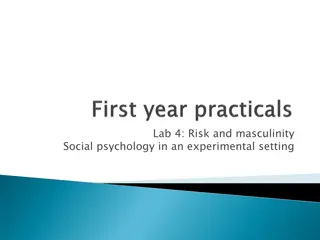Effective Note-Taking Strategies for Academic Success
Explore various note-taking methods discussed by Caroline Havery from UTS, such as annotating texts, creating tables for organized notes, and comparing personal note-taking styles with suggested approaches. Understand the importance of reading in depth and summarizing key points to enhance comprehen
0 views • 29 slides
Effective Test Taking Strategies for Standardized Tests
Explore various tips and strategies for succeeding in standardized tests, including types of tests, preparation techniques, dealing with distractions, managing anxiety, understanding exam formats, and strategies for multiple choice questions. Discover insights into what research indicates about succ
8 views • 30 slides
The Taking of Dental Impressions Training Course
The Taking of Dental Impressions Training Course, provided by the BOS, equips registered Dental nurses with the necessary knowledge and skills for taking dental impressions. The course covers scientific/clinical knowledge, practical skills, patient care, and communication. Successful completion lead
2 views • 69 slides
Principles of History Taking in Clinical Assessment
History taking is a crucial process in patient assessment, aiding in determining the etiology of medical issues. Obtaining an accurate history through proper questioning, active listening, and maintaining a professional appearance is vital for making accurate diagnoses. The history should follow a s
1 views • 35 slides
Mastering Minute-Taking in Technical Writing: Essential Skills and Strategies
Enhance your minute-taking skills with this detailed guide covering the role of a minute-taker, preparing for meetings, setting agendas, the importance of active listening, tips for effective note-taking, structuring minutes, and the overall goals of minute-writing. Learn how to be concise, accurate
0 views • 17 slides
Essential Skills for Musculoskeletal History Taking
History taking is crucial in diagnosing musculoskeletal conditions, with a clinician being 60% closer to a diagnosis with a thorough history. This session covers the structure of history, MSK systemic review, pain assessment, swelling evaluation, and more. Students will learn to take a relevant hist
0 views • 24 slides
Mastering the Five Phases of Focused Note-Taking Process
Explore the essential steps of the focused note-taking process, from taking initial notes to processing, connecting, summarizing, and reflecting on learning. Understand the guiding principles and detailed phases to enhance your note-taking skills effectively.
0 views • 19 slides
Clinical Care for Survivors of Sexual Assault/Rape: History-Taking and Examination
This session focuses on providing clinical care for survivors of sexual assault/rape, emphasizing the importance of history-taking, examination, and appropriate responses. Key aspects include taking a thorough history, conducting physical and forensic examinations when necessary, offering necessary
0 views • 16 slides
Understanding Uterine Cancer and Postmenopausal Bleeding
Dr. Khalid Akkour, Assistant Professor of Gynecologic Oncology at King Saud University Medical City, provides insights on uterine cancer and postmenopausal bleeding. The structured OSCE discusses important aspects such as taking a focused history, age, ethnicity, past gynecologic and obstetric histo
0 views • 154 slides
Computer-Based Tools for Test-Taking: FSA Exam Tips
Explore the various computer-based tools available for test-taking during the FSA exam at Sawgrass Springs Middle School. Learn about features such as the Notepad, Line Reader, Zoom In and Out, Help Tool, and Expand Passage/Item Tool to enhance your test-taking experience. Utilize these tools effect
0 views • 20 slides
Various Branches of History Explored
Explore different branches of history such as Political History, Constitutional History, Parliamentary History, Legal History, Military History, Diplomatic History, and Social History. Each branch delves into specific aspects of the past, shedding light on politics, governance, warfare, diplomacy, a
1 views • 18 slides
Exploring Taking a Stand Through Photographs
Engage in a visual gallery walk to analyze photographs of individuals taking a stand, noting your observations and questions. Reflect on the common themes among the images and discuss the concept of taking a stand. Consider the advantages and disadvantages of gathering information from photographs a
0 views • 17 slides
Taking a Stand in History: Thesis Evaluation
Explore the significance of taking a stand throughout history with examples like Susan B. Anthony, Jonas Salk, Abraham Lincoln, and more. Discover the essence of action behind opinions and beliefs, highlighting moments that shaped our world through individual stances. Learn how to assess the impact
3 views • 8 slides
Effective Patient History Taking in Surgery
Key tips for effective patient history taking in surgery include preparing yourself to be a good physician, emphasizing the importance of appearance, treating patients with empathy, and understanding the components of patient history. It is essential to introduce yourself, delve into the chief compl
0 views • 29 slides
Understanding Gynecological History Taking
This guide explores the process of taking a gynecological history, emphasizing the importance of thoroughness and patient permission. From introductions to obtaining consent, the steps involved in gynecological history taking are outlined. Attention is given to the nuances of gynecological versus ge
0 views • 18 slides
The Importance of Using a Talker and Taking Good Care of It
People communicate in various ways, including talking, writing, and using devices like Talkers. Taking good care of a Talker is essential to ensure it functions properly. Soon, the narrator may get their own Talker, which they look forward to using. Taking care of the Talker is emphasized throughout
0 views • 12 slides
AP World History Course Information
Mrs. Hatlen teaches various courses at Liberty High School, including AP World History. She emphasizes creating a safe and caring environment for her students while focusing on reducing anxiety, fostering laughter, and imparting valuable knowledge. Taking AP World History can help students stand out
0 views • 12 slides
Effective Note-Taking Strategies for Better Study Results
Discover effective study strategies for note-taking, memory platforms, and the Leitner method to enhance learning, retention, and revision. Avoid distractions, use Cornell Notes templates, and optimize flashcards for efficient studying. Learn the importance of automaticity in learning and benefit fr
0 views • 13 slides
Comprehensive Developmental Assessment Process in Pediatric Physiotherapy
This detailed guide covers the subjective examination, history review, prenatal history, perinatal history, postnatal history, and behavioral assessment of children for a comprehensive developmental assessment. It includes aspects such as parental observations, pregnancy complications, birth details
0 views • 71 slides
Understanding Medical Records: History, Physical Examination, and Abbreviations
Medical records play a crucial role in documenting a patient's medical history and findings from physical examinations. The history and physical (H&P) document includes subjective information from the patient and objective observations by the examiner. The history (Hx) record covers personal medical
0 views • 20 slides
Test-Taking Skills and Strategies: Beat Test Anxiety and Ace Your Exams
Understand what test anxiety is, learn how to manage it, and discover effective tips for preparing and taking tests. From recognizing symptoms to practical techniques like deep breathing and positive self-talk, this guide offers comprehensive advice to help you improve your test-taking skills and ac
0 views • 12 slides
Mastering Nursing Test-Taking Skills
Explore the essential elements of test-taking skills in nursing, from analyzing questions to using strategies for choosing the right answers. Learn how to identify critical elements, eliminate incorrect options, and interpret test questions effectively. Enhance your test-taking techniques by underst
0 views • 38 slides
Principles of History Taking and Physical Examination by Dr. Hamad Al-Qahtani, MD
Learn the essential principles of history taking and physical examination as outlined by Dr. Hamad Al-Qahtani, an Associate Professor and Consultant General and Hepatobiliary Surgeon. The guide emphasizes the importance of establishing rapport with patients, the skill of listening to patient narrati
0 views • 56 slides
Effective Strategies for Managing Sleep Problems in Patients
Equip trainees to address patients’ complaints about sleep problems by defining primary and secondary insomnia, understanding causes and management, taking detailed sleep history, discussing sleep hygiene principles, and exploring drug treatment pros and cons. Learn about the definition of sleep p
0 views • 21 slides
Effective History Taking for Surgical Patients
Establishing clear goals, effective communication, and proper patient engagement are crucial in history taking for surgical patients. This process involves identifying symptoms, making diagnoses, understanding overall health status, and addressing patient concerns. It is essential to ask relevant qu
0 views • 49 slides
Mastering Test-Taking Strategies: Essential Tips for Success
Enhance your test-taking skills with these valuable insights from Keisha R. Callins, MD, MPH. Learn about developing your test-taking tactical advantage and understanding your learning style and the test itself. Discover crucial factors like time management, planning, priorities, partnerships, frust
0 views • 26 slides
Importance of Good Note-Taking Strategies in Learning
Taking good notes is essential for better understanding and retention of information. Research shows that handwritten notes are more effective than typed ones as they engage the brain better. To take good notes, preview the material, review previous notes, focus on key points, use visuals, and be co
0 views • 12 slides
Effective Note-Taking Strategies for University Success
Enhance your university experience with these valuable tips: commit to class attendance, concentrate during lectures, connect ideas to enhance understanding, and develop your own note-taking style using methods like Cornell and Question Technique. Explore different note-taking styles and utilize too
0 views • 15 slides
Effective Note-Taking Strategies for Educational Success
Explore various note-taking strategies, challenges faced during lectures, options for formatting notes, organizational techniques, and tech tools like Microsoft OneNote and Evernote. Learn how to optimize your note-taking process for better retention and comprehension in academic settings.
0 views • 28 slides
Effective Note-Taking Strategies for Academic Success
Enhance your note-taking skills with guidance from Moorpark College Writing Center. Learn the process of note-taking, including observing the instructor and yourself, recording key words, using image prompting, mapping, Cornell Method, and summarization. Understand the importance of reviewing notes
0 views • 17 slides
Effective Note-Taking Methods and Their Characteristics
Explore various note-taking methods such as Cornell, outlining, and mapping, each with its advantages and disadvantages. Understand how these methods can be utilized in research, lectures, and meetings to enhance organization, reviewing, and understanding of key information. Dive into the specifics
0 views • 17 slides
Effective Note-Taking Strategies for Academic Success
Good note-taking skills are essential for academic achievement. This comprehensive guide covers the importance of note-making, reasons to take notes, effective strategies, and the benefits of electronic note-taking. Learn how to preview class content, stay focused, and develop a system that works be
0 views • 15 slides
Effective Note-taking Strategies for Successful Learning
Utilize these helpful tips for effective note-taking strategies to enhance your learning process. Reviewing notes within 24 hours of taking them, spending time studying soon after class, preparing before class, sitting at the front during class, and using techniques like recording important ideas an
0 views • 27 slides
The Art of Effective Note-Taking and Reviewing for Enhanced Learning
Learn the importance of effective note-taking in enhancing learning through active working memory and creative methods like graphic organizers, matrices, concept maps, and mind maps. Discover different note-taking representations to improve information retention and understanding. Explore the benefi
0 views • 11 slides
Effective Note-Taking for Consecutive Interpreting
Importance of developing note-taking skills in community interpreting to avoid interrupting speakers, use of digital recorders in court for long consecutive interpreting, considerations for emotionally charged settings, and principles for effective note-taking in interpreting practice. The significa
0 views • 40 slides
Efficient Medical History Taking Guidelines
Medical history taking is a crucial step in diagnosis, involving the patient's account of illness and relevant information. Following a structured framework helps identify potential diagnoses. Key elements include personal information, chief complaint, presenting illness history, review of systems,
0 views • 51 slides
Effective Strategies for Student Success in Test Preparation and Test Taking
Learn valuable tips and best practices to excel in your courses and tests. Discover how to assess your study habits, prepare effectively, utilize good test-taking strategies, and optimize your learning potential. Gain insights on planning, time management, note-taking, and improving memory retention
0 views • 18 slides
Ophthalmology History Taking: Importance and Components
Ophthalmology history taking is crucial for identifying and narrowing down differential diagnoses, screening for hidden diseases, and protecting patients from harm. Components include patient profile, chief complaint, history of present illness, past ophthalmic and medical history, drug and family h
0 views • 24 slides
Surgical History Taking and Patient Evaluation Guidelines
Proper history taking in surgery involves gathering detailed information through patient interview, examination, and investigation. Elements such as chief complaint, past medical history, family history, and social background are vital for accurate diagnosis and treatment planning. This process help
0 views • 24 slides
Understanding Risk and Masculinity in Social Psychology Experiments
This experimental setting explores the impact of testosterone levels on risk-taking behaviors, using digit ratio as a proxy measure for testosterone. The Balloon Analogue Risk Task (BART) is employed to assess risk-taking tendencies in individuals with high and low testosterone levels. The measureme
0 views • 7 slides

